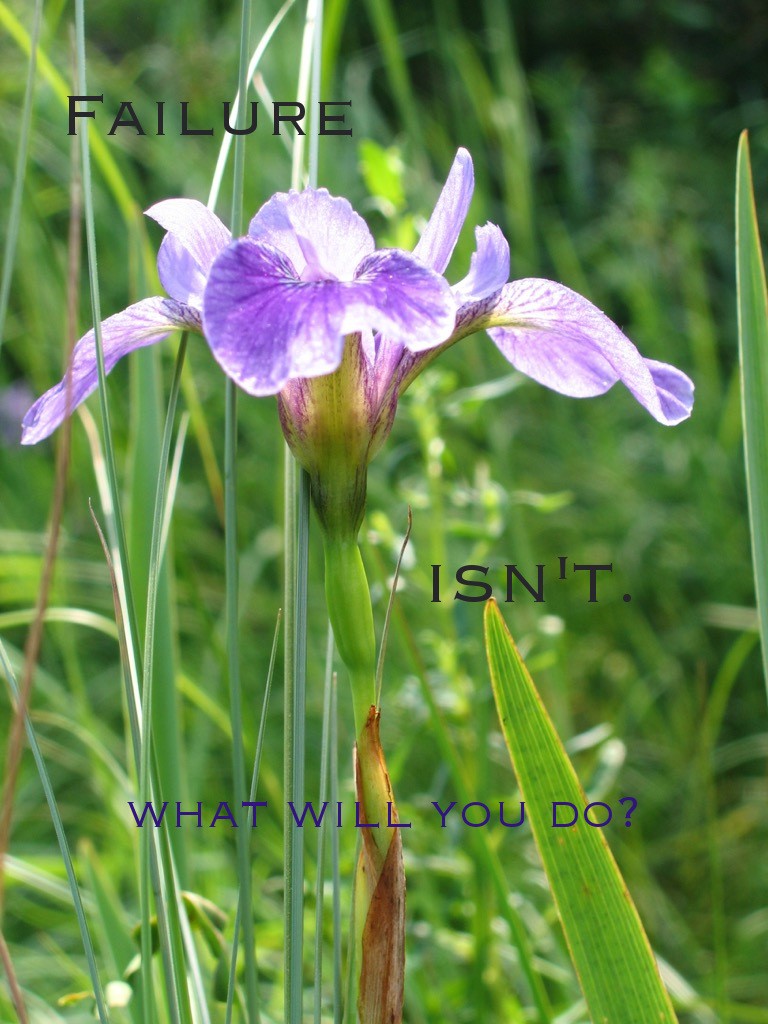How would you define failure?
Think about it for a minute. How would you define failure?
When you try to nail it down you may discover the term is pretty slippery, because failure looks different in different situations. Probably the simplest definition is: failure is the opposite of success.
Okay. So how would you define success? You probably think of success as achieving your goals, right?
Say, for instance, you want to write a novel. If your goal is simply to write the novel, then once the manuscript is complete you have accomplished your goal. You have succeeded.
But if your goal is not only to write the novel, but that it be published and have a readership of 10,000 people, then you might feel like you have failed if it has a readership of 7000. (Never mind that 7000 people have experienced your creative work.)
It’s still the same novel. But with one goal you saw it as a success. With a different goal you judged it a failure.
Let’s say you wanted your novel to be read by 10,000 people, but now instead of 7000 only one person read it. Surely that would count as an abysmal failure, wouldn’t it? But suppose that one person, reading your book, had an idea that prompted her to do something that touched the lives of tens of thousands. Did you still fail?
Let’s take it further. Suppose nobody reads your novel, but in the course of writing it you learned things about yourself, or about the art of writing, that you couldn’t have learned any other way. Would you still call that a failure? Or suppose that nobody reads your novel, but as you were working out the challenges the characters faced in the story you resolved a painful experience in your own past. Did you still fail?
As you start to examine success and failure, you will probably discover that it’s all pretty arbitrary. It depends entirely on the goals you (or someone else) place on something. Furthermore, you will discover that not only are those goals arbitrary, they are usually based on cultural values that are quite meaningless.
The truth is we never know what impact we have on the world. The effect we have on others may be completely invisible to us, and oftentimes quite unrelated to the goals we set for ourselves. That’s why judging something a “success” or a “failure” is meaningless.
In fact, the more you dig down, the more you will find that failure is simply impossible, because whenever we do anything, something changes.
Okay. Then maybe we could simply define failure as inaction. Suppose you never get around to writing that novel, even though you’ve been wanting to for as long as you can remember. Suppose you die having never written it. Surely that would count that as a failure, wouldn’t it?
This is where we need to take a closer look at what really lies beneath our ideas of success and failure.
Success and failure are concepts we use to judge—and judgment rests on the idea that there is something called “not good enough.” Judgment presupposes the idea that something or someone (yourself perhaps?) can be insufficient and flawed. If you take an even closer look you will probably discover that you gauge your worth on whether you “succeed” or “fail.”
If so, you’re not alone. This is a widespread human phenomenon that reveals our lack of understanding of what is real and of who we are.
Your worth is complete. It has no criteria and no pre-conditions. You were born with it and you will die with it, and nothing that happens—or doesn’t happen—in between your being born and your dying can alter it in any way. You are not more worthy if you write the novel and not less worthy if you don’t. On a cosmic scale, it is simply impossible for you to “fail,” because such judgment doesn’t exist.
Sure, if you really want to write the novel but don’t, you’ll probably feel disappointed. But don’t fall into the trap of believing you have short-changed the Universe, or that you are somehow a lesser person. Intentions are like seeds. Sometimes they sprout and grow and sometimes they don’t—and it’s all okay.
Life isn’t about “success” and “failure.” Life is about being on the journey of discovering who you are, and growing into the fullness of that. And quite frankly, the experiences we usually deem to be “failures” almost always teach us the most. So how then can they possibly be considered failures?
This is your life to live, and you can’t go wrong. Follow your heart. Explore. Learn what there is to learn. Let the discovery of your own essence be your North Star.
You’ve probably heard the question: What would you do if you knew you couldn’t fail? But I’d like to ask you a different question. What will you do, given that failure doesn’t exist?
Share this post’s image on your Facebook or Pinterest page.
You can also share favorite passages by highlighting them.
Like what you read? Click the circle to subscribe to my newsletter.


Thanks Patricia. Yeah to blogging again and to having not blogged for a while:) And I LOVE the vision of a whole planet full of beings following their essence , their true North Star!!!
Yes! Let’s hold that vision!
PATRICIA!!!!
So Glad you are back on the air!! I have missed your insightful posts big-time!! The current one, as is typical, does not disappoint. Many great points to contemplate.
All the best, Ed
Ed, thank you, as always, for your enthusiastic support! It means a lot to me.
I now deeply understand the true meaning of “failure” which I have dealt with for too long. Reading and rereading your words, “failure” is truly now out of my mind. What a gift to me with your words. I see myself now in a continuous journey of discovering who I really am and I can grow from my heart rather than my mind completely. A wonderful new day!
Sue, I am so very pleased the blog touched you in this way. What more could I hope for? May you continue on your journey of self-discovery–in which you cannot fail!
Thanks for this fine reflection. Truly our worth is not determined by our accomplishments nor our evaluation of them. Vic
Vic, thank you for this feedback. May we all hold to our inherent worth, and not look for it outside ourselves.
Patricia, I was so glad to see your blog — I have missed it. I love the message and the challenge.
Thanks, Maureen. I enjoyed writing it. I’m glad you enjoyed reading it!